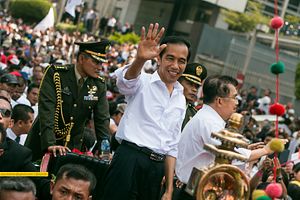Dedi Dinarto (see: Is Indonesia Choosing the Indian Ocean Rim Association Over ASEAN?) is right to observe that Indonesia under President Joko “Jokowi” Widodo has lost interest in trying to lead ASEAN. However, Indonesia has not instead shifted its regional leadership ambitions to the Indian Ocean, but eschewed them altogether in favor of pragmatic bilateralism.
Jokowi was elected president in 2014, partially as a remedy to the widely-perceived vacillating leadership of his predecessor Susilo Bambang Yudhoyono. One of the new president’s first foreign policy statements was to distance himself from the multilateralism and summitry of the Yudhoyono years. “If it’s not beneficial, I won’t do it… we’ll still meet but not too much,” Jokowi stated.
Jokowi has instead endeavored to transform his country into a “global maritime fulcrum” between the Pacific and Indian Oceans. This has manifested itself in the foreign policy sphere as a near single-minded pursuit of foreign investment to fund the president’s ambitious infrastructure plans (central to his re-election strategy in 2019). This has been complemented by an active policy of dynamiting foreign vessels caught illegally fishing in the vast archipelago’s territorial waters, in order to burnish the president’s nationalist credentials and defend against charges that he has opened Indonesia up to the highest bidder.
While Jokowi has indeed overseen a turn away from ASEAN leadership, Indonesia has not yet moved in any significant way toward the Indian Ocean. Indonesia’s current turn as chairman of the Indian Ocean Rim Association (IORA) has resulted only in the IORA Concord, at most a road map toward greater regionalism, a goal that has so far been elusive amongst the grouping’s diverse membership. The Concord resonates more with “Indonesia’s institutionalist diplomatic culture and inclusivist foreign policy” than real ambitions to lead in the Indian Ocean.
The Indian Ocean Region does not align well with Jokowi’s stated ambition of developing Indonesia into a “global maritime fulcrum.” The region’s dominant economy – that of India – offers limited prospects for joint cooperation on infrastructure projects within the archipelago. Since coming into office in October 2014, Jokowi has met his Indian counterpart only once, in December last year; in contrast he has met with President Xi Jinping of China five times and Prime Minister Shinzo Abe of Japan six times.
Additionally, the region does not pose the same security concerns for Jakarta. Indonesia may indeed not want to see another South China Sea situation in the Indian Ocean, where last year its Navy clashed with Chinese vessels on three separate occasions (see: A Third 2016 Natuna Stand-Off Highlights Growing Indonesia-China Tensions), but no such threat exists. The growing power in the Indian Ocean Region, namely India, does not have a border dispute with Jakarta, and in fact has a long history of joint naval patrols along its shared maritime border with Indonesia in the Andaman Sea (see: India, Indonesia Kick Off Joint Naval Patrols).
Indonesia’s interests remain, as they always have, in the Pacific. The choice faced by Jakarta is not between one ocean or the other, but whether it will take on the burden of leadership attributed to it as the so-called “natural leader” of ASEAN or continue to eschew it in favor of an economically-driven bilateral approach.
David Willis is a PhD Candidate in International Relations at Flinders University.

































